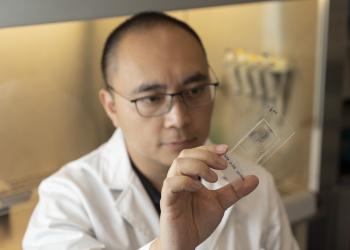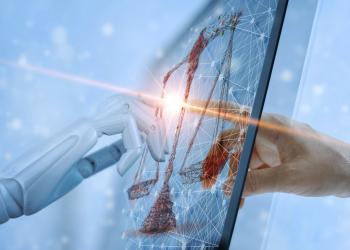News & Stories
2019

News
Read My Lips: AI for Hearing Aids
Padmanabhan KRISHNAMURTHY (Paddy)’s sister worked with an NGO in India that helps people with visual impairment. He observed that people with any kind of impairments face immense difficulties, and wanted to do something to alleviate their problems. This inspired him and his teammate Amrutavarsh Sanganabasappa KINAGI (Amrut) to invent a lip-reader named “Helen”, which has just won the top prize in the 2019 HKUST President’s Cup that encourages undergraduate students to showcase creativity, innovation, and excellence.
Named after Helen KELLER, the renowned American author and educator who overcame the adversity of being blind and deaf to become one of the 20th century's leading humanitarians, the lip-reading device is expected to benefit millions of people when it’s well developed. According to the World Health Organization, there are 466 million people globally with some form of disabling hearing loss, and this number is forecasted to grow up to 900 million by 2050.

News
Baby Steps, Big Dreams
In Hong Kong, 1 in 6 couples struggles to get pregnant, compared to 1 in 10 two decades ago. In China, the infertility rate has risen to 12-15% from just 2.5% in the early 1990s. Many couples have begun to seek medical help to fulfil their desire to have a baby – there are 50 million patients with fertility problems in China. Listening to Dr. SHU Yiwei Ervin, current student of MPhil Program in Technology Leadership and Entrepreneurship (TLE) offered by the Division of Integrative Systems and Design of HKUST's School of Engineering, talk about the pain involved in the in-vitro fertilization (IVF) process, and his hope that his startup can eventually increase the success rate of the procedure, is both moving and inspiring.
News
HKUST Researchers Co-Discover a Novel Function of an Enzyme Offering Insight Into the Pathology of Hereditary Spastic Paraplegia
Researchers of the Hong Kong University of Science and Technology (HKUST) and Institute of Biophysics, Chinese Academy of Science recently identified that an enzyme called atlastin (ATL) is used to regulate the transportation of proteins within cells. This novel finding offers new insights into the pathology of Hereditary Spastic Paraplegia – a rare inherited disorder with symptoms of lower limb spasticity accompanied by possible neurological deficiencies.

News
Time to Smell the Roses in Race of Life
Humans are creatures who often judge whether a dish is attractive or a stranger is friendly simply by their own eyes. But our sense of smell is just as important.
We all may have the experience of eating with a stuffy nose and found a dish to be tasteless or using our nose to check whether it has gone bad.
Moreover, people tend to keep their distance from a person with an unpleasant odor, while special odors like gas can alert us to dangers of a leak.
As the old Chinese adage goes, "My shack is better than an emperor's bed."
What makes our own shack better?
Our smell, together with the smell of our family members, and pets as well if any, makes it unique and reassuring.
To understand how smell impacts people, researchers at the University of British Columbia, Canada, invited 96 couples for a study last year.

News
HKUST New App (PRAISE-HK) Uses Street-Level Air Quality Data to Reduce Personal Exposure and Health Risk
HKUST Institute for the Environment today launched a new mobile app that aims to help users reduce their exposure to outdoor air pollution. PRAISE-HK stands for “Personalized Real-time Air-quality Informatics System for Exposure – Hong Kong” and will help build Hong Kong into a world-class smart and healthy city. Funded by HSBC 150th Anniversary Charity Program, PRAISE-HK is a five-year project commenced in November 2016, and covers three major release milestones for the mobile app and the system:

News
HKUST and Xunlei Establish Joint Laboratory to Drive Innovation and Applications of Blockchain Technology
The Hong Kong University of Science and Technology (HKUST) and Xunlei Limited (Xunlei or the Company) today announced the establishment of HKUST-Xunlei Joint Laboratory on Blockchain Technology (the Joint Lab). The Joint Lab aims to develop cutting-edge and influential blockchain technologies that are applicable to various industries and establish a high-performance blockchain ecosystem in the Guangdong-Hong Kong-Macao Greater Bay Area.
A signing ceremony was held on HKUST campus, marking the official launch of the Joint Lab and research collaboration. Prof. Tim CHENG, Dean of Engineering of HKUST, and Ms. LAI Xin, the Chief Engineer of ThunderChain at Xunlei, signed the collaborative agreement as witnessed by Prof. Nancy IP, Vice-President for Research and Development of HKUST, and Mr. CHEN Lei, Chief Executive Officer of Xunlei and Onething Technologies.
News
HKUST to lead Hong Kong’s Largest Research Project on Extreme Weather Prediction and Landslide Early Warning System by Using Artificial Intelligence
An international and multidisciplinary research team led by the Hong Kong University of Science and Technology (HKUST) was recently granted a research fund of HK$91.85 million by the University Grants Committee (UGC). Under the leadership of Prof. Charles NG Wang-Wai (HKUST Associate Vice-President for Research and Development and CLP Holdings Professor of Sustainability), this project will deliver a comprehensive extreme weather and landslide warning system. This novel system will increase the forecast lead time of heavy rainfall from three to six hours, thereby giving the general public and responders more time to prepare for potential disasters.

News
Robo-lawyer: Your AI Conflict Resolution
Getting a divorce is hard, but going through paperwork and court proceedings can leave a deeper scar. A team of HKUST’s Computer Science and Engineering (CSE) students, supervised by professors and alumnus, has developed a “robo-lawyer” that not only saves time and money, but also paves the way for wider application of artificial intelligence technologies in the legal profession.
Hong Kong’s divorce rate in 2016 was more than double that in 1991. The rising demand for family mediation has been a mounting challenge for Albert SO, a CSE alumnus from HKUST, who chairs the Hong Kong Mediation and Arbitration Centre. Few divorcing couples actually realized that the high legal costs and procedural drag would take an emotional toll on themselves, says Albert. Many of them are unwilling or unable to sit down for a mediation that could take months or years, especially for cross-border couples.








